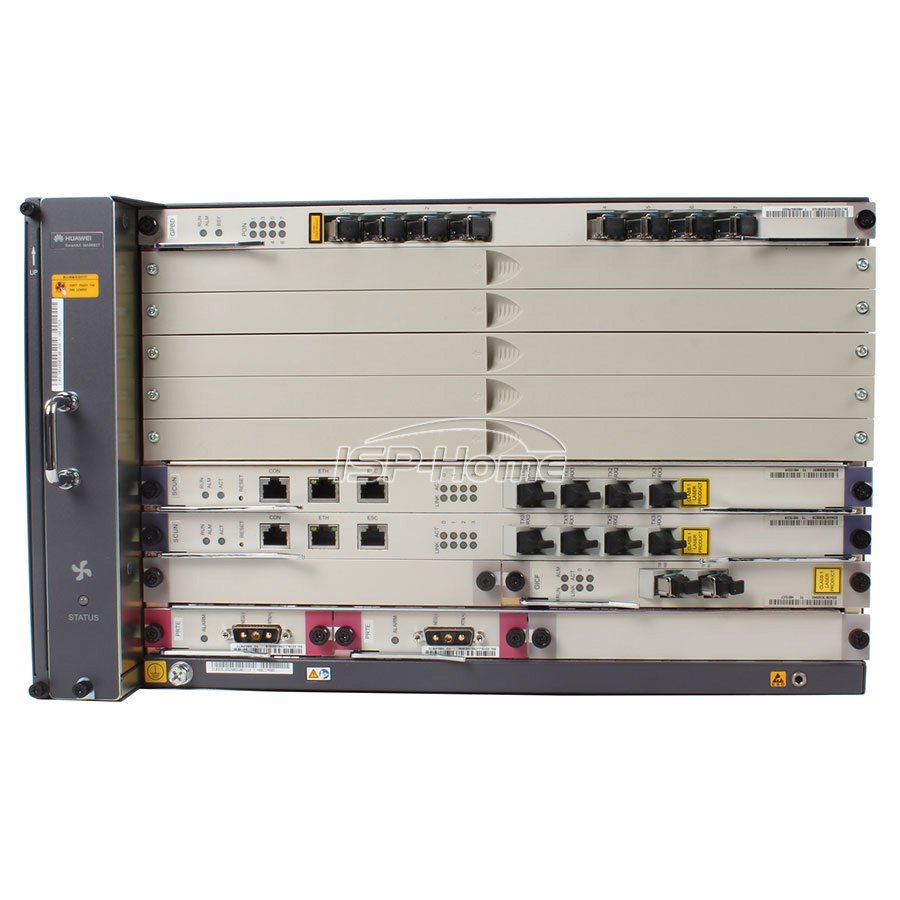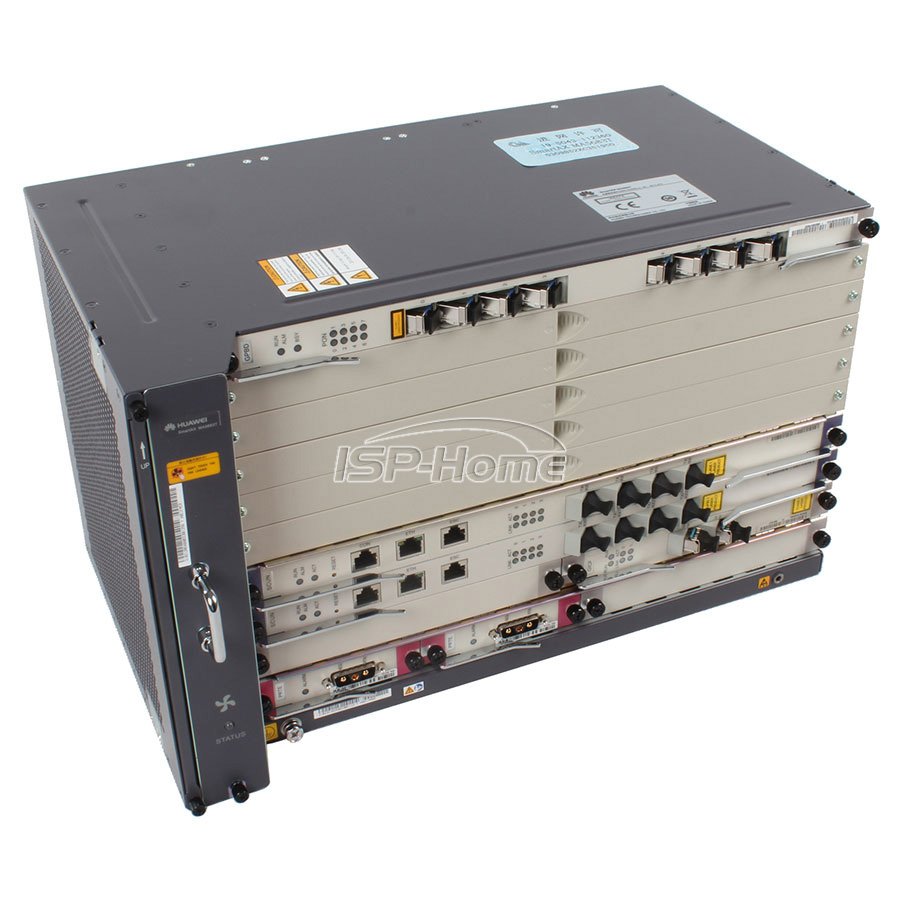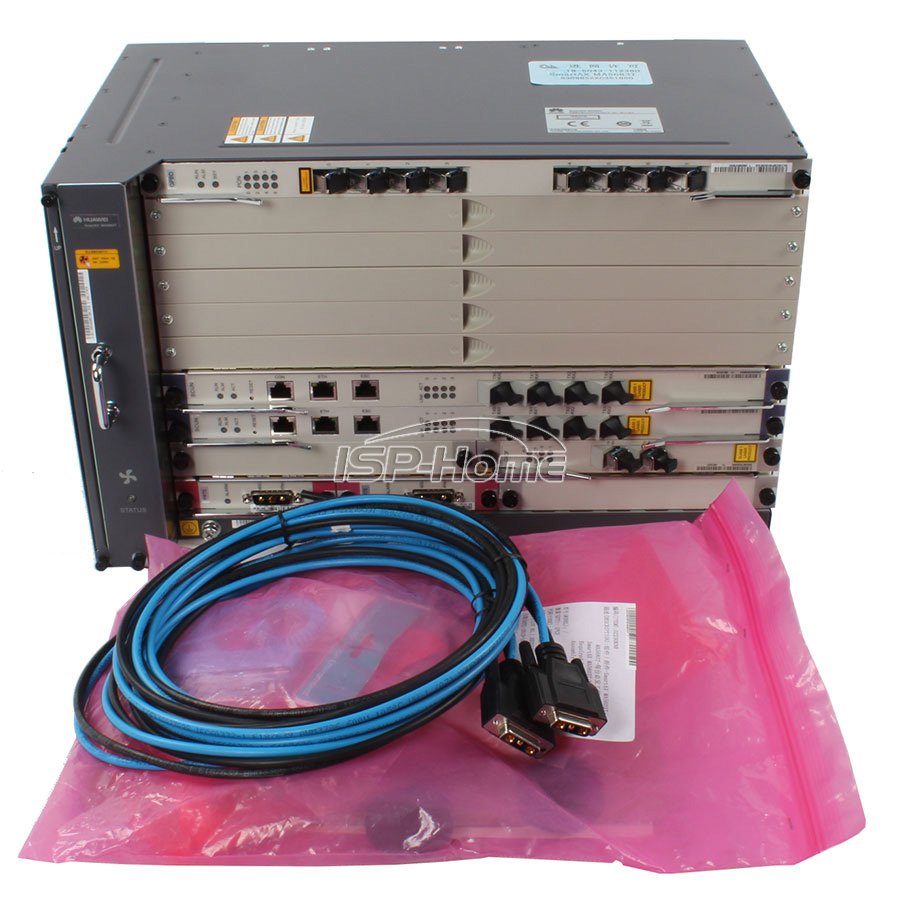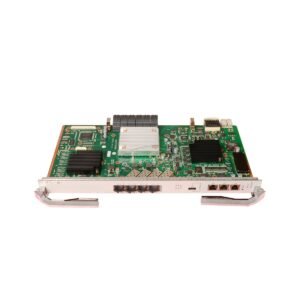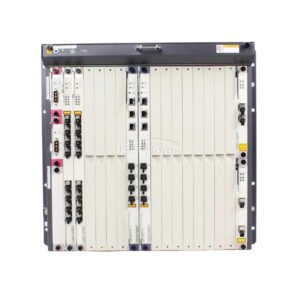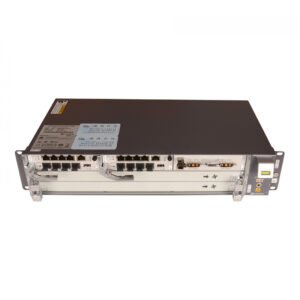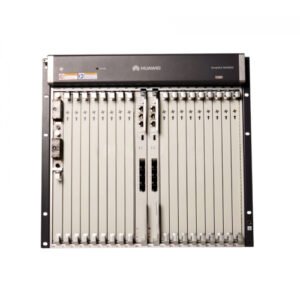Description
The Huawei MA5683T is an aggregation-grade Optical Line Terminal (OLT) supporting up to 6 service slots and 12,000 GPON subscribers. It offers uplink flexibility with GICF (GE optical) or X2CS (10G) boards and features dual redundant DC power slots. ISP-Home.com offers different bundles ensuring seamless deployment for any scenario
Key Specifications
ISP-Home has MA5683T Optical Line Terminal OLT in stock
Packing dimension : 600*480*530mm
Gross weight : 20.5kg
Huawei MA5683T similar as MA5603T, same function if work as pure OLT
Support GPON, EPON and P2P
Support GPON & EPON simultaneously
Chassis supports 6 Service Slots
Support 8-GPON port interface card GPBD,GPBH, 16-GPON port interface board GPFD
Support GPON split ration 1:128
Support GE Electrical(GICG uplink board) GE (GICF uplink board) or 10G uplink( X2CS uplink board)
Support Transmit Distance 20KM
Power: DC based, if site only have AC, need to purchase telecom level AC-DC converter (available from ISP-Home)
ISP-Home.com has different interface boards of OLT in stock for you to choose.
MA5683T Layout
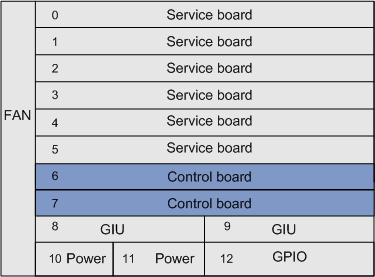
MA5683T Tech Specification
| System performance | |
|---|---|
| Backplane bus switching capacity | 1.5 Tbit/s |
| System L2 packet forwarding rate | SCUB: 72 Mpps SCUN: 726 Mpps(Active/Standby mode), 1452 Mpps(Load-sharing mode) SCUF: 190 Mpps SCUH: 1428 Mpps(Active/Standby mode), 2856 Mpps(Load-sharing mode) |
| Control board switching capacity | SCUB: 48 Gbit/s SCUN: 480 Gbit/s(Active/Standby mode), 960Gbit/s(Load-sharing mode) SCUF: 128 Gbit/s SCUH: 960 Gbit/s(Active/Standby mode), 1920Gbit/s(Load-sharing mode) |
| Switching/Forwarding delay | Short forwarding delay: The 100 Mbit/s Ethernet port sends the 64-byte Ethernet packets at a delay shorter than |
| BER in full load | BER of port when transmitting data in full load < 10 e-7 |
| System performance | |
| System | |
| Redundant configuration | System availability in typical configuration > 99.999% |
| Mean Time Between Failures (year) | ≈45 |
| Configuration | |
| Maintenance port | Number of 10 Mbit/s/100 Mbit/s maintenance Ethernet ports: 1 Number of serial ports for local/remote maintenance: 1 |
| Monitoring port | Number of environment monitoring serial ports: 1 |
| Maximum number of GPON ports in a subrack | 96 |
| Maximum number of 10G GPON ports in a subrack | 24 |
| Maximum number of P2P FE ports in a subrack | 288 |
| Maximum number of P2P GE ports in a subrack | 288 |
| Maximum number of upstream ports (GE ports in the GIU slot) in a subrack | 8 |
| Maximum number of upstream ports (10GE ports in the GIU slot) in a subrack | 4 |
| Management ports > Outband management Ethernet port (RJ-45) | SCUB/SCUN/SCUH control board: 1 Port Per Board |
| Management ports > Local serial port (Console) | SCUB/SCUN/SCUH control board: 1 Port Per Board |
| Upstream ports > GE electrical port | GICE: 4 Ports Per Board GICG: 2 Ports Per Board |
| Upstream ports > GE optical port | GICF/GICK: 2 Ports Per Board SCUB/SCUN/SCUH/GICD/GSCA: 4 Ports Per Board ETHB/SPUA/SPUF: 8 Ports Per Board SPUC: 40 Ports Per Board |
| Upstream ports > 10GE optical port | X2CS/SPUA: 2 Ports Per Board SPUC: 4 Ports Per Board SPUF: 8 Ports Per Board |
| Upstream ports > E1 port | TOPA: 16 Ports Per Board |
| Upstream ports > STM-1 upstream optical port | TOPA: 2 Ports Per Board |
| Upstream ports > PON upstream optical port | P2CA: 2 Ports Per Board (One PON port is available and the other is backup.) |
| Service ports > GPON port | GPBD/GPBH: 8 Ports Per Board GPFD: 16 Ports Per Board |
| Service ports > 10G GPON port | XGBC: 4 Ports Per Board XGBD: 8 Ports Per Board |
| Service ports > P2P GE optical port | OPGD/OPGE: Single-fiber bi-directional: 48 Ports Per Board, Two-fiber bi-directional: 24 Ports Per Board |
| Service ports > P2P FE optical port | OPFA: 16 Ports Per Board OPGD/OPGE: Single-fiber bi-directional: 48 Ports Per Board, Two-fiber bi-directional: 24 Ports Per Board |
| Service ports > Ethernet optical port | ETHB: 8 Ports Per Board |
| Service ports > E1 port | H802EDTB: 16 Ports Per Board |
| Device Specifications | |
| Dimensions (W x D x H, excluding mounting brackets) | 442.00mm x 283.20mm x 263.90mm |
| Dimensions (W x D x H, including mounting brackets) | 535.00mm x 283.20mm x 263.90mm, for ETSI cabinet 482.60mm x 283.20mm x 263.90mm, for IEC cabinet |
| Weight (empty chassis) | 7.0kg |
| Working environment temperature | For an indoor cabinet Configured with 1 subrack: -25°C to +65°C Configured with 2 subracks: -25°C to +55°C |
| Working environment humidity | 5% RH to 95% RH |
| Atmosphere pressure | 61 kPa to 106 kPa |
| Altitude | < 4000m |
Huawei MA5600T Series OLT Comparison
| Huawei Optical Access Pure OLT Model Comparison | |||
| Item | MA5680T (IEC) | MA5683T | MA5608T |
|---|---|---|---|
| Dimensions (W × D × H), excluding mounting brackets | 442mm × 275.8mm × 441.7mm (Height: 10U) | 442mm × 283.2mm × 263.9mm (Height: 6U) | 442mm × 244.5mm × 88.1mm (Height: 2U) |
| Power | -48V DC power input | -48V DC power input | -48V DC power input or 110/220V AC power input |
| Board Configuration | 2 slots for control boards 14 slots for service boards 1 slot for the universal interface board 2 slots for upstream interface boards 2 slots for power interface boards | 2 slots for control boards 6 slots for service boards 1 slot for the universal interface board 2 slots for upstream interface boards 2 slots for power interface boards | 2 slots for control boards 2 slots for service boards 1 slot for the power interface board |
| Maximum number of GPON ports in a subrack | 224 | 96 | 32 |
Purchase Guide
To determine the required number of GPON service boards, first calculate the total number of GPON subscribers to be connected. While the OLT technically supports a 1:128 splitting ratio, a ratio of 1:64 or lower is commonly used in practice for optimal performance.
Calculation Formula
For GPBD or GPBH boards (each with 8 GPON ports):
Number of boards = Total subscribers ÷ (64 subscribers per port × 8 ports per board)
For GPFD boards (each with 16 GPON ports):
Number of boards = Total subscribers ÷ (64 subscribers per port × 16 ports per board)
Available GPON Service Boards
- GPBD: 8-port GPON Interface Card
- GPBH: 8-port Advanced GPON OLT Interface Board
- GPFD: 16-port GPON OLT Interface Board
Uplink Board Selection
Select an uplink board based on your bandwidth requirements and network infrastructure. Optical interfaces are recommended for higher bandwidth and longer distances. Consider a dual-uplink board design for enhanced reliability.
Available Uplink Boards
- GICF: 2-port 1000Base-X Gigabit Ethernet Optical Interface Card
- GICG: 2-port 10/100/1000Base-T Gigabit Ethernet Electrical Interface Card
- X2CS: 2-port 10G SFP+ Optical Interface Card
Power Board Selection
The PRTE DC Power Board is the standard choice for MA5680T series devices. Dual power board configurations are common for redundancy. For locations without -48V DC power, a telecom-grade AC-to-DC converter (EPS30-4815AF) is required.
Main Control Board Selection
The SCUN Super Control Board is the recommended main control unit for the MA5680T. Deploying a dual main control board configuration is a standard practice to ensure high availability and system reliability.
FAQ
Q: What is the difference between MA5680T and MA5683T?
A: The only difference is capacity, MA5683T max support 6 service slots, MA5680T max support 16 service slots. So MA5683T with smaller chassis.
Q: What is the difference between MA5680T and MA5600T?
A: MA5600T is multi service based while MA5680T is just OLT, MA5600T can support service like ADSL, VDSL, GPON etc, while MA5680T only supports GPON, P2P etc, but their hardware and configuration command is the same.
Q: Does MA5680T support AC power?
A: No, but you can purchase a telecom level AC to DC converter if you just have AC power source.
Q: Can I use MA5680T main control board SCUN as uplink so as to save the uplink board cost?
A: Yes, you can, but we don’t suggest, as Huawei OLT SCUN load balance is not well supported, so most customers are using SCUN in active/standby mode, if OLT lose power, which SCUN will work as the active SCUN will be randomly, which may affect service, also if the link is down, the active SCUN will not shift to the standby SCUN (it will only shift when SCUN board is down), then service may get affected also.
Q: Can I have 1000 Base-T as uplink?
A: Yes, instead of GICF uplink board you can purchase GICG uplink board, if use GICF, you can buy a electrical SFP module then you can have 1000 Base-T.
Q: Can I buy 10G uplink board instead of GE?
A: Yes, then you may request ISP-Home sales quote you X2CS board instead of GICF uplink board, each X2CS provide 2*10G ports.
Q: What is the max transmit distance between GPON OLT and ONT?
A: Max 40KM.
Q: Can I use 1:128 split ratio with B+ SFP Module?
A: Yes, but not suggested, most of ISP-Home customers even use C+ module, are max using 1:64 split ratio.
Q: Do you also offer FTTH tool and accessories?
A: Yes, as a one-stop FTTx solution&products provider, also we offer FTTx accessories like SFP modules, optical splitter, fiber cable, optical connector/adapter/attenuator, fiber closure, patch/pigtail cord, ODF, terminal box, FTTx tools etc.

